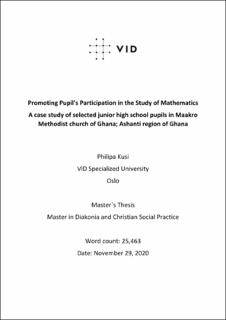| dc.description.abstract | Described as basic requirement and a compulsory subject, Mathematics has been the biggest challenge for most pupils in the African countries and to be more precise Ghana as a country. Continuous research shows/ proves pupils’ poor performance in Mathematics as compared with other subjects. This study aims to answer the question ‘How has the Methodist church at Maakro Circuit, in Kumasi, Ghana, used their after-school programme to promote pupils’ interest and abilities in Mathematics?’. The research explores the impact and nature of after-school programme on pupils’ performance in Mathematics and how the Methodist church is an instrument to empowering pupils. Diakonia and Empowerment in Mathematics, Motivation and sociocultural theory are three theoretical frameworks for this thesis. Some related concepts like teaching methods are also used in this thesis. These theories and related concepts explore how the Methodist church at Maakro is responding to pupils’ interest and abilities in Mathematics in the Ghanaian context. The research was conducted with the help of interviews with nine (9) participants; Methodist church leaders (Ministers), facilitators as well as earlier pupils who were privileged to be part of the after-school programme. Also, observation was done by the researcher for more information on the grounds. The findings gathered were grouped into three themes: Importance of Mathematics, teaching methods and attitudes of teachers, and teaching materials and equipment. These were analysed thematically, interpreted, and discussed in relation to the theoretical framework. The study reveals that the themes were the basis for promoting pupils´ interest, participation, and improvement in Mathematics. The study has emphasized that activity method of teaching which serve to engage pupils’ full participation was ensured to increase pupils’ interest in mathematics. From a diaconal perspective one can say that the professionals in the church are doing diaconal work; showing extra love, care, and selfless services to meet both their academic and social needs among all the pupils. The support been given is backed by their faith as Christians. Also, the extra love, care and patience demonstrated by professional teachers in the church inspired and motivate some pupils to improve in mathematics and continued their education in mathematics. ii The study concludes with recommendations, for example the church should extend the after school programme to all basic school pupils in the church and to the community. | en_US |
